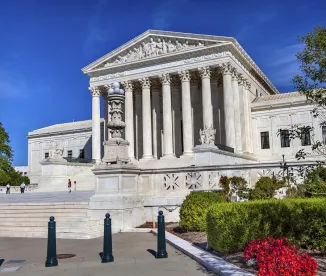On March 19, 2018, the US Supreme Court denied a petition for writ of certiorari in Garco Construction, Inc. v. Speer. In doing so, the Court declined an opportunity to revisit an important and controversial administrative deference standard, known as Auer or Seminole Rock deference, which requires courts to give “controlling weight” to an agency’s interpretation of its own regulations. The deference afforded to an agency’s interpretation of its own regulations is often a critical issue in environmental litigation. The Court’s decision not to reconsider the deference standard at this time means that agencies will continue to have great latitude to construe their own regulations.
However, while the Court denied the petition, Justice Thomas issued a dissent, joined by Justice Gorsuch, criticizing the Auer and Seminole Rock deference standard. Justice Thomas wrote that “this would have been an ideal case to reconsider Seminole Rock deference, as it illustrates the problems that the doctrine creates,” and he described the doctrine as “constitutionally suspect” and “on its last gasp.”
Justice Thomas’s dissent will likely add fuel to the growing calls to reconsider Auer and Seminole Rock. Legal commentators (see here, here, and here) have increasingly criticized the fact that under Auer and Seminole Rock courts are required to defer to an agency’s current interpretation of its own regulations, even if the agency’s own view of the regulation has changed over time and the interpretation in question has never been subject to notice-and-comment or other regulatory procedures. This deference to untested or evolving interpretations generates bad incentives, commentators argue. By giving administrators a broad mandate to interpret their own regulations, agencies are incentivized to produce vague regulations, which increases regulatory uncertainty and surprise. Moreover, such broad deference increases the ease with which agencies may change their interpretations according to political pressures and changes in administrations.
If the Supreme Court continues to pass on opportunities to overturn Auer and Seminole Rock, a legislative fix may be pursued. As discussed on this blog previously, Congress recently considered legislation that would have amended the Administrative Procedure Act to require that courts decide “de novo all relevant questions of law, including the interpretation of constitutional and statutory provisions and rules.” Such legislation would overturn not just Auer and Seminole Rock, but also the related Chevron deference doctrine. We will continue to monitor both judicial and legislative efforts to reconsider these important agency deference




 />i
/>i

